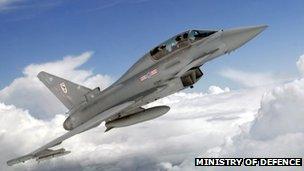How Germany killed the merger of BAE and EADS
- Published
- comments

Here is the tactful statement from BAE Systems and EADS explaining why they have buried their plans to merge:
"Notwithstanding a great deal of constructive and professional engagement with the respective governments over recent weeks, it has become clear that the interests of the parties' government stakeholders cannot be adequately reconciled with each other or with the objectives that BAE Systems and EADS established for the merger."
Here is a translation of all that by a source close to the two companies: "it turns out that the German government is fundamentally opposed to the deal, and there was no way we could get round that."
You will presumably recall from my earlier notes on all this (poor you) that the boards of EADS and BAE made it a condition of the £28bn marriage going ahead that France and Germany should limit their ownership and control of the enlarged company.
Which is why pretty much everyone believed it would be France - with its statist and interventionist penchant - which would blow up the transaction.
But as it turned out, the German government was just as unrelaxed about allowing EADS - owner of Airbus and therefore a strategically important manufacturer - to run itself in an arms-length and commercial way.
Once German intransigence became clear - as it did overnight (see my post of yesterday evening) - EADS and BAE had no option but to call the whole thing off.
The point is that BAE's biggest customer is not the British government but the US government. And there was no way that the Pentagon would continue to classify BAE as a privileged supplier of sensitive technology if it felt that the company was somehow under the sway of two foreign governments - even governments, in the form of France and Germany, regarded as allies.
BBC Business editor Robert Peston: "The German government's opposition stopped the deal"
Anyway, there is a whole super-jumbo airliner full of paradoxes about the way this deal was both negotiated and the way it fell apart. Here are some of them, in no particular order.
First, the boss of EADS, whose corporate dreams have been squished by Angela Merkel and co, is a German ex-paratrooper. He's been mugged by his own compatriots.
Second, BAE's owners, as opposed to its board, aren't weeping about the collapse of the deal. Many of them - led by BAE's largest owner, Invesco Perpetual, with 13.3% of the company - had strong reservations about it.
Third, the rationale for BAE's board for the deal was that it would cushion it from severe recession in the defence industry, caused by cuts in military spending by over-indebted governments, such as those of the US and UK. But if only BAE had not sold its 20% stake in Airbus in 2006, it would not be so exposed to the capriciousness of ministers deciding what to spend on jets, military vehicles and bombs.
In fact the reason the merger had the support of the UK government is that the British prime minister is profoundly unrelaxed that Airbus UK, maker of wings for the eponymous airplanes and supporter of 140,000 hi-tech jobs in Britain, is wholly owned by EADS, and is therefore in effect controlled by the French, German and Spanish governments (which have a concert-party agreement or owners' pact in relation to 50.5% of EADS's shares).
So although the merger of EADS and BAE collapsed because the German government was not prepared to let go of the enlarged business, the fact that Germany is not prepared to give EADS its commercial freedom is of relevance to the UK's manufacturing future - at a time when Britain would be seen to have far too few hi-tech manufacturing jobs.
UPDATE 15:20 BST
I have just spoken to the chairman and chief executive of BAE, Dick Olver and Ian King respectively.
They say that they had their "red lines" in respect of future relations with the French and German governments, and therefore had no choice but to drop the merger, when negotiations with Germany in particular become more fraught.
According to Mr King, Germany became "more intransigent about issues than anyone would have believed".
Interestingly, although formal agreement on the crucial issues had not been reached with France either, Paris was behaving in a more constructive way than Berlin.
In simplified terms, what mattered to BAE - and to EADS - was that France and Germany would agree to limit their ownership and control of the enlarged business (and see my earlier note for why this was a commercial imperative for BAE).
Will they attempt to revive the merger at some future date? That is not in their minds right now.
But if Berlin and Paris at some point - and of their own accord - make it clear that their opposition to the transaction has abated, BAE and EADS would then have another go.
I would say that the mood of BAE's two top people was one of tiredness, but they were not demoralised.
Although BAE faces huge challenges, because of the squeeze in US and UK defence budgets, they believe their other international operations are in good shape - and they are positive about their small civil businesses.
That said, there will be a few months of unsettling uncertainty for BAE, as its biggest customer, the US government (which contributes 40% of BAE's revenues) goes through the presidential election and then an ensuing debate until the middle of next year about the future size and shape of American defence spending.
Will BAE be vulnerable in that period to an opportunistic bid from one of its US rivals, such as Lockheed? Maybe. But British government sources have told me that such a takeover would be unwelcome and it would use its "golden" share in BAE - which gives it special powers - to block any such deal.